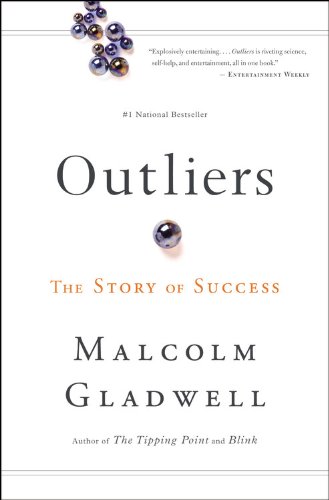Book read - Outliers

Outliers, the story of success, a masterpiece from The Tipping point and Blink fame Malcolm Gladwell. The book takes though journeys of various famous personalities and cultures that behaved a little differently in order to be either successful or complete failures, whom the author called as outliers.
Gladwell presents a lot of compelling reasonings and arguments behind what it takes to create an outlier - passion, talent, genius, hard work - all the usual suspects or is there anything else that supports or push all the above reasonings to create an actual outlier?
Some of the key highlights and learning from the book are mentioned below. I have tried not to give away all the details as I encourage the reader to actually read the book but these points are just to make sure I capture the key take aways that I can revisit later.
To be at the right place at the right time
Gladwell starts off with an example of Canadian Hockey League teams where most of the highly successful players were born at the start of the year, from January to May.
Is that coincident? Astrology?
Well, not so. In Canada the eligibility cut-off for age-class hockey is January 1. So a boy who turns ten on January 2 then could be playing with someone who does not turn 10 until late in the year - a gap of almost 12 months - a huge difference in stamina and maturity specially among such young kids. Suddenly such kids become better than his team mates in every aspect of strength and maturity to play the game.
Gladwell backs up this argument with a lot of examples of the big star players from decades of Canadian Hockey leagues being born earlier in the year than later.
The 10,000 hour rule
But is being at the right place at the right time enough for someone to make it to hockey major league or say become a billionaire like Bill Gates and Bill Joy or a famous music band as The Beatles? May be not. Gladwell presents examples of a lot of successful personalities and groups who obviously were at the right place at the right time but had already mastered their field and were ahead of the curve by the time they got the opportunity to make it big. Or in other words, they were ‘lucky’.
Bill Gates, being born in wealthy family in Seattle, was sent to the best private school of the area where he got access to a time sharing terminal computer ASR-33. So he got to do real-time programming as an eighth grader in 1968! Lucky! However, he got just hooked it, putting lot of hours writing code when other kids of his age were going though their usual school routines. So by the time Gates dropped out of Harvard, he was already programming for seven consecutive years - way past ten thousand hours.
The Geniuses dilemma
Gladwell presents the case of Chris Langan, a man with extraordinary intelligence and a very high IQ, who in spite of having such gifts could not make it big and successful. He tries to present various incidents in his life, all pointing towards the fact that Chris didn’t get the right opportunities and help along the way to allow him to make right use of his talent and intelligence. So even a man with one-in-million mind who had the ability to get through Principia Mathematica at age of sixteen, could not become an outlier as he had to make his way alone and no one- not rock stars, not software billionaires and even geniuses- ever makes it alone.
Hard work from rice paddies to mathematics
What makes Asians, especially Chinese so good in mathematics and science? Gladwell points out the cultural history of Chinese farmers who are mostly do rice farming, which requires a lot more care and hard work in order to have a good crop. Chinese farmers had to work extra hard in order to get more crop and prosper, a culture that passed on from generation to generation resulting in similar approach to other aspects such as learning and mathematics. Some of the quotes from these farmers explain it all,
“No food without blood and sweat”
“In winter lazy man freezes to death”
Gladwell makes an amazing point on how schools in USA enjoy a big summer vacation (you should read the book to find the reasoning) while schools in China and various other Asian countries have shorter vacations and almost a full year of schooling.
To summarize and I quote the author
“ Success follows a predictable course. It is not always the brightest who succeed. Nor is the success the sum of decisions and efforts we make on our own behalf. It is rather, a gift. Outliers are those who have been given opportunities - and who had strength and presence of mind to seize them. However, the lesson here is that to build a better world we need to replace the patchwork of lucky breaks and arbitrary advantages that today determine the success - the fortunate birth dates and happy accidents of hits - with a society that provides opportunities for all. “